Alabama commission looks at further grocery tax cuts, potential revenue replacement

Alabama commission looks at further grocery tax cuts, potential revenue replacement by Jemma Stephenson, Alabama Reflector November 15, 2023 Members of a state commission looking at the impact of grocery tax repeal looked at the recent cut to the tax, the potential for slower education budget growth, and alternate revenues. Alabama in September cut the state’s 4% tax on groceries to 3%, the first reduction in the tax since it was first implemented in 1939. Prior to the cut, Alabama was one of only three states that fully taxed groceries, driving some local levies as high as 10%. Cuts to the tax have been a long-term goal of anti-poverty groups, which said the tax affected food security and the ability of low-income Alabamians to feed children, as well as conservatives in favor of cutting taxes. “It impacts lower income Alabamians more harshly than it impacts higher income Alabamians,” said commission member Akiesha Anderson, policy and advocacy director of Alabama Arise. The bill froze but did not reduce local taxes on groceries. If the Education Trust Fund (ETF) budget, where proceeds from the tax go, grows by 3.5% next year, the state tax will be cut to 2%. “We’re all excited about that possibility coming sooner rather than later,” said Sen. Andrew Jones, R-Centre. Kirk Fulford, deputy director of the fiscal division of the legislative services agency, said Tuesday that “later” seemed more likely. The director told the committee that he was not predicting growth in the ETF for Fiscal Year 2024. “Just based on the first month, I mean, we’re in negative growth,” said Fulford after the meeting. Publicly available information on the Education Trust Fund shows that income tax returns were lower in October than they were last October, the biggest drop in the Education Trust Fund. The Education Trust Fund is around $74.4 million lower than it was this time last year. About $54.7 million of that decrease is from income tax. Fulford said to reporters after the meeting that there are four parts to the income tax. He said withholding, or taxes withheld from a paycheck, has kept up with Alabama’s low unemployment. “The other components are what, first of all, jumped way up and then last year came right back down,” he said to reporters after the meeting. Fulford said over email before the meeting that October 2022 receipts last year were up by $65 million, so this year could be a return to normalcy after several years of drastic increases. Fulford said cutting local grocery taxes could affect local governments, who sometimes levy higher taxes on groceries than the state. “So there would be a bigger dollar figure impact at the local level if you eliminated all the groceries,” he said. House Ways and Means Education Committee chair Danny Garrett, R-Trussville, said in October that he did not expect to cut the tax further in the next legislative session, which begins in February. Commissioners brought up a number of different ways that revenues could be potentially restored to the Education Trust Fund. Anderson said she thinks that more tax dollars for education means better education. Alabama spends less on average than the national average on per pupil spending. According to the U.S. Census data released in May, Alabama spent $10,683 per student in fiscal year 2021, compared to a national average of $14,347. One idea was taxing services after first being brought up by Anderson. “I will point out that you are absolutely right; the economy and the world that we’re living in as a service economy, the state of Alabama, local governments don’t generally tax services on a broad scale, that may very well be something to look at to consider to investigate,” said Fulford. Fulford and Rosemary Elebash, state director for the National Federation of Independent Businesses, said that it had been discussed in the 1990s and later under former Gov. Bob Riley, who was in office from 2003 to 2011. Elebash said there were concerns about that also being a regressive tax. “They went so far as to tax haircuts, vet services, and people are unhappy when you start taxing their dogs and cats,” said Elebash about a previous attempt. Anderson asked if there had been any thought about taxing professional services, such as attorneys, that might avoid the regressive structure. Fulford said that there had been an occupational tax issue in Jefferson County that led to multiple lawsuits. “But there certainly has been an issue,” he said. The Joint Study Commission was formed to study the grocery tax and will file a report in 2026 after annual meetings. “Not to procrastinate, of course, but we got some time to get our homework done,” said Jones. Alabama Reflector is part of States Newsroom, a network of news bureaus supported by grants and a coalition of donors as a 501c(3) public charity. Alabama Reflector maintains editorial independence. Follow Alabama Reflector on Facebook and Twitter.
Alabama Department of Education wants to boost literacy in later grades
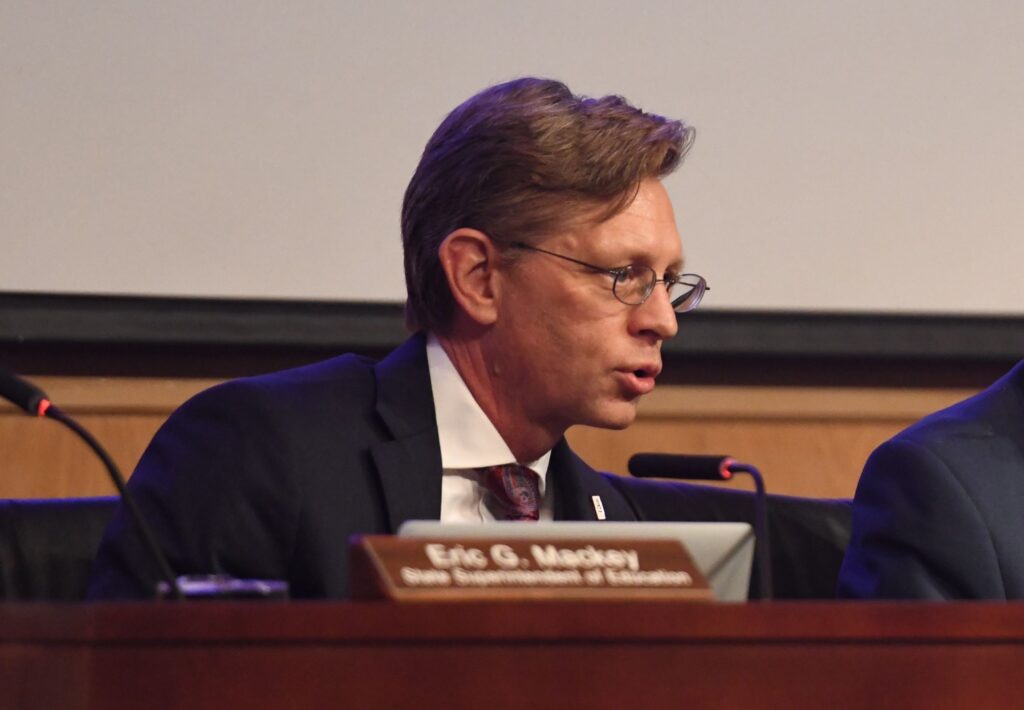
Jemma Stephenson, Alabama Reflector Having spent years focusing on reading skills for early elementary school students, the Alabama State Board of Education is seeking funds to boost literacy after third grade. The State Board of Education on Oct. 12 approved a budget request for “struggling readers beyond grade 3” for $22 million. Last year, the Board had requested $3 million but did not receive any funding for the program. State Superintendent Eric Mackey said during the September work session that the earlier program had been a small one for a small number of students. The rest of the board members wanted to see something larger. The $22 million would go to professional training for teachers. Mackey said in a phone interview they’ve heard from superintendents that they want an equivalent professional development for teaching literacy for teachers from fourth to sixth grade, like kindergarten through third grade under the Literacy Act. “Some of them are already doing it but this would give us a chance to really expand that,” he said. The Alabama Literacy Act, passed In 2019, aimed to get all students reading on grade level by the end of third grade and boost overall literacy scores in the state. The bill provides funding for teaching training and reading coaches to ensure students master reading. Students that are not reading at grade level by the end of third grade could be held back a year. At the September work session, Mackey said that the department need funding for readers beyond third grade because the law states that Alabama Reading Initiative funds cannot be used beyond that point. But students don’t stop struggling with reading after third grade. Vicky Askew, a reading specialist with Tallapoosa County Schools, said that continuing reading instruction past the third grade is important. She said that some students in her system are getting reading intervention in fourth and fifth grade, if they have enough instructors who work with at-risk students in learning literacy. “I feel like they need it because we can’t just say, ‘Oh, they’re in fourth grade: Good luck,’” she said. House Ways and Means Education chair Danny Garrett, R-Trussville, said he was not familiar with the specific request in the board’s budget, but he supports literacy. “Reading is a priority for the Department of Education and also for the Legislature,” he said. Rep. Terri Collins, R-Decatur, the chair of the House Education Policy committee and the sponsor of the Literacy Act, said Tuesday she has not looked into what exactly the board is asking for, but she said she was happy to hear about the request. “I think that we will see a large group in summer school this year which is one of the ways to go ahead and move towards promotion, which is what we want for all of the students but we want to make sure that they’re reading,” she said. Collins said that having teachers know how to teach the science of reading, a body of research about learning literacy, is a good thing. In the National Assessment of Education Progress, or the “nation’s report card,” scores released in 2022, Alabama improved relative to many other states due to learning loss in other states. Alabama’s own scores were relatively stagnant and remained below average. NAEP proficiency is not equivalent to Alabama grade level. Mackey told the Montgomery Advertiser in 2022 that the department had been focused on elementary grade level scores for a while, and middle school had not received as much attention. Mackey said this funding is part of a focus on the middle school years. He said the Numeracy Act, which focuses on math improvement, looks at grades kindergarten through eighth grade. The Literacy Act, he said, also discusses intermediate years. “It’s just that it’s not funded, so we’re asking for some funding,” he said. The education budget is first reviewed by the governor, who will make a funding request to the Legislature when the Legislature returns for its regular session in February. Mackey said he doesn’t know what the grand total for the Education Trust Fund will be. He said that their roughly $6.2 billion request, which is just for kindergarten through twelfth grade, is probably more than will be allotted. Higher education funding also comes from the Education Trust Fund but is not included in the department’s request. Later, he said, the department will work with executive offices on a real budget number to identify priorities and how funding is allocated. Mackey said their role is identifying needs in schools, not balancing the budget. “So we’ve identified needs, and we’ve asked for a lot,” he said. Alabama Reflector is part of States Newsroom, a network of news bureaus supported by grants and a coalition of donors as a 501c(3) public charity. Alabama Reflector maintains editorial independence. Follow Alabama Reflector on Facebook and Twitter.
Speaker Nathaniel Ledbetter appoints House Members to serve on a study commission evaluating Alabama’s labor force participation

Alabama has the lowest unemployment rate in state history. There are job openings all over the state that businesses and governments cannot fill, yet the state has one of the country’s worst labor force participation rates. That Alabamians are choosing to stay home rather than join the booming economy has increasingly perplexed state leaders. “Despite having one of the lowest unemployment rates in the country and a record number of Alabamians working, the percentage of Alabamians participating in the labor force is lower than almost any other state,” Governor Kay Ivey wrote recently. “While we are increasing that by the tens of thousands, we have to change this statistic. Getting folks off the sidelines and into the labor force is my next priority.” On Monday, Speaker of the House Nathaniel Ledbetter announced members of the Alabama House of Representatives that will serve on an ad hoc committee studying Alabama’s labor force participation rates and identifying barriers to workforce entry. “Alabama is witnessing record-breaking economic growth and historically low unemployment rates,” Ledbetter said. “Despite these numbers, in Alabama, there are roughly 140,000 job openings and, at the same time, 48,834 unemployed workers across our state. That means we are lacking nearly 100,000 workers over 16 years old, which puts our labor force participation rate at a mere 57 percent—one of the lowest rates in the entire country.” The House members appointed to serve on the study commission will be Rep. Reed Ingram (R–Pike Road), who will serve as the Chairman of the Committee. Rep. Danny Garrett (R–Trussville); Rep. Donna Givens (R–Robersdale); House Minority Leader Anthony Daniels (D–Huntsville); Rep. James Lomax (R–Huntsville); Rep. Barbara Drummond (D–Mobile); Rep. Mike Kirkland (R–Scottsboro); Rep. Bill Lamb (R–Tuscaloosa); Rep. Kelvin Lawrence (D–Hayneville); Rep. Curtis Travis (D–Tuscaloosa); Rep. Chris Pringle (R–Mobile); Rep. Matt Woods (R–Jasper); Rep. Wes Kitchens (R–Guntersville); Rep. Jim Carns (R–Birmingham); and House Majority Leader Scott Stadthagen (R–Hartselle). “Over the coming months, it will be imperative for this group to build on the progress of, and collaborate with, existing entities such as the Lt. Governor’s Commission on 21st Century Workforce, the Alabama Community College System, Alabama higher-education institutions, and essential stakeholders across the private sector,” Ledbetter said. The study commission is expected to address areas including extending adequate childcare to families, examining the correlation between productivity growth and labor output, ensuring wages and salaries are competitive, addressing workforce housing concerns, and offering improved and more expansive mental health programs and services to citizens. “An insufficiency of resources such as these creates barriers to workforce entry as much as an absence of quality education,” Ledbetter postulated. The study commission is slated to host their first meeting on Thursday, October 5, at 10:00 a.m. in room 617 of the Alabama State House. To connect with the author of this story or to comment, email brandonmreporter@gmail.com.
Nathaniel Ledbetter announces House members who will serve on labor force participation study
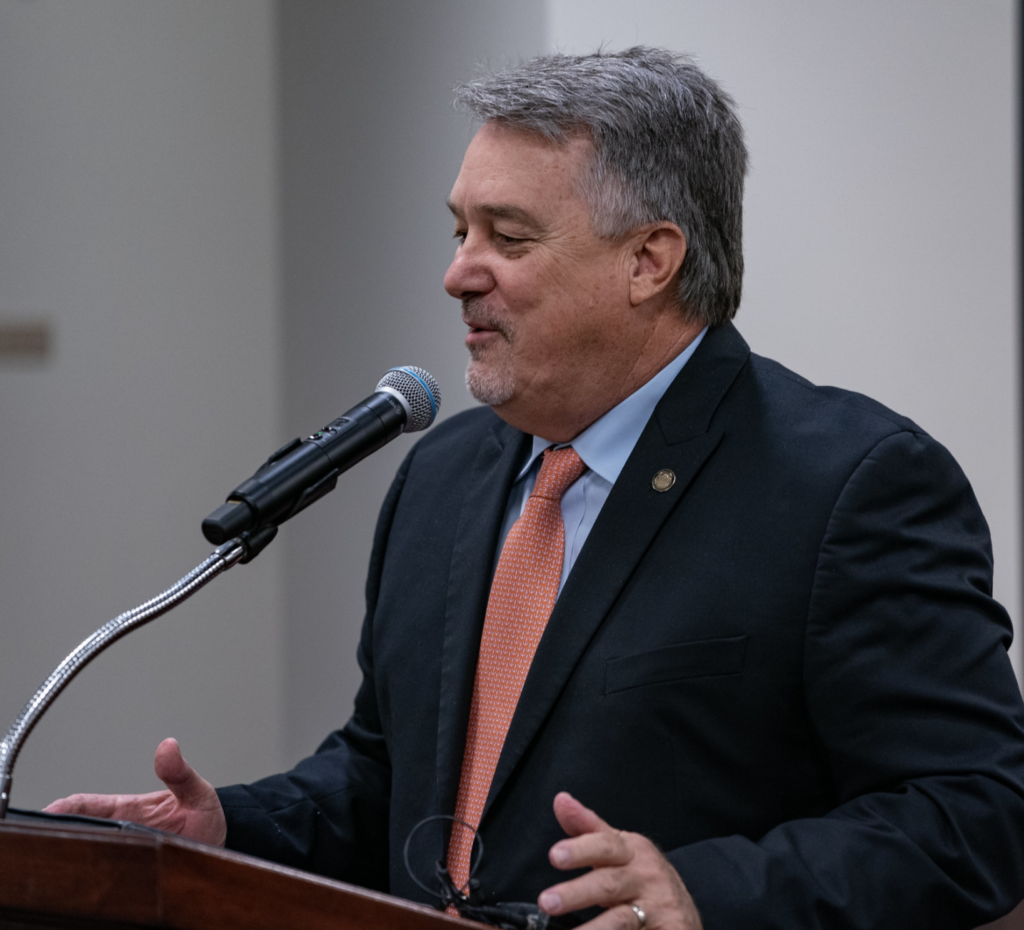
With unemployment still sitting at a record low of 2.1%, the state is looking for ways to increase the number of Alabamians in the workforce. Speaker of the House Nathaniel Ledbetter announced on Monday key House members that will serve on an ad hoc committee studying Alabama’s labor force participation rates and identifying barriers to workforce entry. In July, Gov. Kay Ivey said labor force participation was a top priority. “Despite having one of the lowest unemployment rates in the country and a record number of Alabamians working, the percentage of Alabamians participating in the labor force is lower than almost any other state,” Gov. Ivey wrote in an op-ed. “While we are increasing that by the tens of thousands, we have to change this statistic. Getting folks off the sidelines and into the labor force is my next priority.” In September, Alabama Department of Labor Secretary Fitzgerald Washington announced that Alabama’s Labor Force Participation Rate (LFPR) rose only slightly in August to 57.0%. This is up from last August’s rate of 56.9%. “Alabama is witnessing record-breaking economic growth and historically low unemployment rates,” Ledbetter said in a press release. “Despite these numbers, in Alabama, there are roughly 140,000 job openings and, at the same time, 48,834 unemployed workers across our state. That means we are lacking nearly 100,000 workers over 16 years old, which puts our labor force participation rate at a mere 57 percent—one of the lowest rates in the entire country.” “Yet again, we are announcing record-breaking economic statistics this month,” said Secretary Washington. “While our labor force participation rate remained unchanged, we are continuing to work with marginalized groups to get them into our labor force.” The House Members serving on the study commission will be Rep. Reed Ingram (R–Pike Road) – Chairman; Rep. Danny Garrett (R–Trussville); Rep. Donna Givens (R–Robersdale); Rep. Anthony Daniels (D–Huntsville); Rep. James Lomax (R–Huntsville); Rep. Barbara Drummond (D–Mobile); Rep. Mike Kirkland (R–Scottsboro); Rep. Bill Lamb (R–Tuscaloosa); Rep. Kelvin Lawrence (D–Hayneville); Rep. Curtis Travis (D–Tuscaloosa); Rep. Chris Pringle (R–Mobile); Rep. Matt Woods (R–Jasper); Rep. Wes Kitchens (R–Guntersville); Rep. Jim Carns (R–Birmingham); Rep. Scott Stadthagen (R–Hartselle). “Over the coming months, it will be imperative for this group to build on the progress of, and collaborate with, existing entities such as the Lt. Governor’s Commission on 21st Century Workforce, the Alabama Community College System, Alabama higher-education institutions, and essential stakeholders across the private sector,” stated Ledbetter. Some specific areas the study commission will address are extending adequate childcare to families, examining the correlation between productivity growth and labor output, ensuring wages and salaries are competitive, addressing workforce housing concerns, and offering improved and more expansive mental health programs and services. “An insufficiency of resources such as these creates barriers to workforce entry as much as an absence of quality education,” Ledbetter concluded.
Akiesha Anderson: Alabama’s grocery tax reduction: A penny saved, a better future paved

The first stop on the road to untaxing groceries in Alabama is straight ahead. Lawmakers achieved a significant victory for the people this year by passing legislation to cut the state’s 4-cent grocery tax by half. That change will begin this Labor Day weekend, as the first 1-cent reduction takes effect September 1. Ultimately, this small change likely will result in large savings for Alabamians who are working hard to make ends meet. Once the new law is fully implemented, many families will have hundreds of dollars more available each year to spend on food or other expenses. For decades, Alabama Arise has focused on reducing and ultimately eliminating the state sales tax on groceries, which essentially taxes survival. At the beginning of the 2023 legislative session, Alabama stood as one of only three states with no tax break on groceries. Thanks to determined advocacy by Arise members and other advocates, our state is off that shameful list at last. The story behind the legislative triumph Arise collaborated this year with many partners and lawmakers to introduce and pass the grocery tax reduction. That list includes the Alabama Grocers Association, Lt. Gov. Will Ainsworth, Sens. Andrew Jones and Merika Coleman, and Reps. Danny Garrett and Penni McClammy. This year’s breakthrough also would not have happened without other legislative champions who laid the groundwork for this moment, including former Reps. John Knight and Thad McClammy, former Sen. Hank Sanders and Reps. Laura Hall, and Mary Moore. The grocery tax law’s passage is a testament to the importance of continuing to hold the line and fight for change for as long as it takes. It’s also a testament to the importance of seizing the moment when opportunity arrives. Something spectacular happened this year as the stars finally aligned after decades of advocacy. When this year’s session began, many Alabamians were struggling with inflation and higher costs for essentials like eggs and bread. Simultaneously, the state was witnessing strong revenue growth. As elected officials began talking about one-time tax rebates, advocates recognized an opportune moment to make permanent progress on reducing the state grocery tax. And the revenue growth ensured this reduction would not cause severe harm to funding for our children’s public schools. A positive step forward State leaders seized this window of opportunity and united across partisan lines to reduce the grocery tax. It was amazing to witness the culmination of decades of hard work. And it was inspiring to see nearly every legislator co-sponsoring this monumental legislation. Many lawmakers tout this as the state’s largest tax cut ever, and it is one that will provide the biggest everyday benefit to people with low incomes. Ultimately, Alabama Arise remains dedicated to transforming the state’s regressive tax system into a more progressive one. Progressive tax systems levy taxes based on one’s ability to pay, whereas regressive systems work in the reverse. The grocery tax has long exemplified regressive taxation, burdening those with fewer resources by requiring them to pay proportionally more than wealthier individuals. Reducing the state grocery tax is a step in the right direction for tax justice. This penny saved is symbolic of a better future being paved for Alabama. What lies ahead Arise will continue advocating to eliminate the state grocery tax while protecting Education Trust Fund revenues. We look forward to working with the new Joint Study Commission on Grocery Taxation to find a sustainable path forward. Rebalancing Alabama’s upside-down tax system will require both lower taxes for people with low incomes and higher taxes for wealthy households and highly profitable corporations that can afford to pay more. As this year’s grocery tax reduction takes effect, we celebrate its many champions – most notably the Alabamians who stayed vigilant to ensure their voices translated into tangible policy improvements. We also celebrate this policy change as a symbol of progress and unity, and as a testament to what state leaders can accomplish when they put partisanship aside to pass legislation with profound benefits for individuals and communities. Cheers to eliminating the first cent, and to the ongoing journey toward a more prosperous and equitable Alabama! Akiesha Anderson is policy and advocacy director of Alabama Arise, a statewide, member-led nonprofit organization advancing public policies to improve the lives of Alabamians who are marginalized by poverty. Arise’s membership includes faith-based, community, nonprofit and civic groups, grassroots leaders, and individuals from across Alabama.
Will Ainsworth: Alabama’s historic grocery tax goes into effect, but more work remains to finish the job

Alabamians are feeling a bit of relief at the grocery store checkout lines as a result of the tax cut on food that a coalition of conservative lawmakers and I pushed through the Legislature during the 2023 regular session. Beginning on September 1, the state’s four percent sales tax on grocery items was reduced to three percent, and if growth in the Education Trust Fund continues at the same pace as recent years, another $150 million tax cut will automatically go into effect as soon as 2024. My goal is to continue chipping away at the tax until it is eliminated altogether in the near future. Alabama was one of only three states that taxed groceries at the full rate – South Dakota and Mississippi are the others – and we are one of only 13 states in the nation that levy any tax on food. The newly-implemented tax cut applies to any food that falls under the definitions of the federal food stamp program, known as SNAP in D.C. circles, which means all groceries are covered except for pre-prepared, hot food from in-store delis. A clause in the law that is now in effect blocks cities and counties from raising their sales taxes on groceries so Alabamians can be assured of the intended savings, but mayors, council members, and commissions do have the option of following our lead and cutting the local sales taxes on groceries if they choose. For several decades, advocacy groups pushed to remove the grocery tax, but their plans always required new taxes to be shifted onto the backs of the middle class in order to offset revenue losses. As a conservative Republican who believes in cutting taxes, not simply moving them around like a rigged shell game, such proposals were considered non-starters in my eyes and those of my GOP colleagues. During my term in the Alabama House and now, as lieutenant governor, it became obvious that the commonsense budgeting practices put in place after Republicans gained control of the Legislature in 2010 were creating surpluses and comfortable fiscal cushions that did not previously exist. The pro-business measures we enacted were also creating an economic atmosphere that attracted both new and expanding industries and encouraged employers ranging from the largest companies to the smallest mom-and-pop storefronts to create new jobs and opportunities for Alabamians who were willing to work. Soon enough, the unprecedented revenues flowing into the state treasury meant we could afford to begin eliminating the grocery tax without burdening any Alabamians with new or offsetting levies. I worked closely with Sen. Andrew Jones (R – Centre), House Education Budget Chair Danny Garrett (R – Trussville), and Senate Education Budget Chair Arthur Orr (R – Decatur) to create a workable plan that also offered full protection to public education funding for K-12 schools, community colleges, and four-year universities. I personally met with countless experts, advisors, and associations, including the grocers who collect the tax at the point of sale, and rallied them to join us in taking action. Once the bill was drafted, my office recruited all 35 members of the Alabama Senate and 100 of the 105 House members to sign on as sponsors, which was considered by many pundits to be a political miracle in the highly partisan and philosophically contentious times in which we live. The legislation eventually passed both chambers with unanimous, bipartisan support. It is estimated that our dinner table tax cut will save the average Alabama family the cost of two weeks of groceries, which is essential when Bidenomics is causing inflation to skyrocket along with the price of gas and other everyday essentials. Between 2022 and 2023, the cost of food rose by an average of 7.7%, according to the U.S. Bureau of Labor Statistics. Eggs alone cost a third more than they did last year, bread and cereal are up by 25%, and meat, fish, and chicken are substantially higher. Our success in cutting the grocery tax demonstrates what can be accomplished if we stay true to our conservative beliefs, build consensus, and have the courage to attempt to accomplish what many say can’t be done. But the job is only half-complete. We must eliminate the second half of the grocery tax, and a legislative study group we empaneled is already running the numbers, making plans, and putting together a blueprint to accomplish that goal. In the meantime, Alabamians will find their wallets are just a bit fatter, and their bank accounts are just a bit fuller as savings at the checkout continue to accrue, but rest assured that my colleagues and I are working hard to finish our mission of providing you with full relief from taxes on the groceries you purchase. Will Ainsworth has served as lieutenant governor of Alabama since 2019.
Gary Palmer holds meet-and-greet town halls
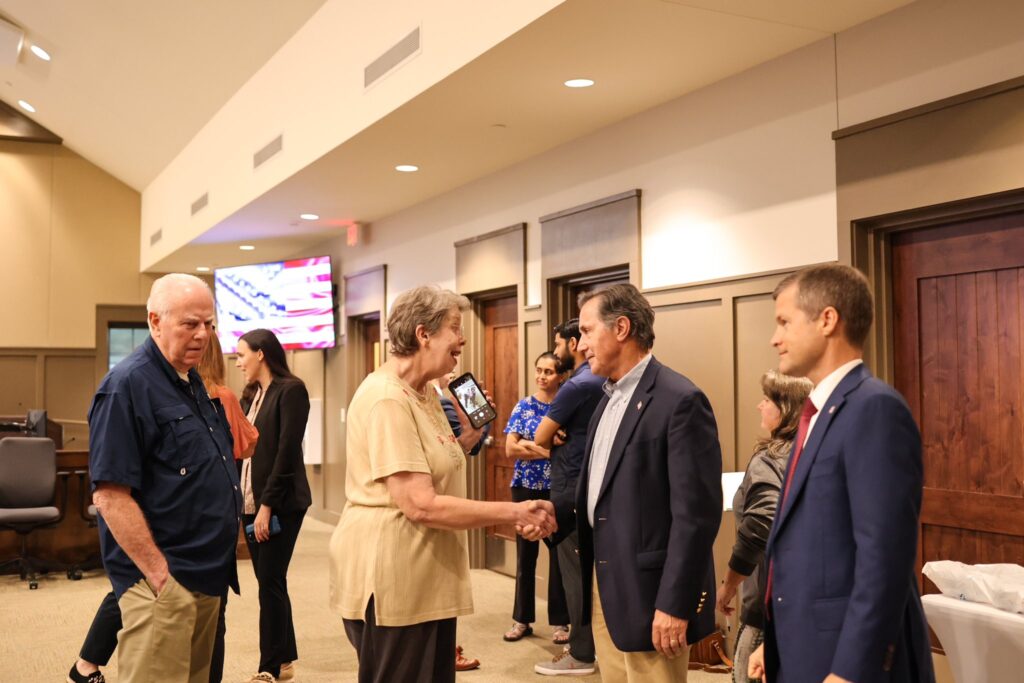
Congressman Gary Palmer (R-AL06) was back home in the district this week. Palmer, his wife, Ann, and his staff hosted meet-and-greet format town halls with constituents in Alabaster on Monday and Trussville on Wednesday. Alabama Today caught up with Palmer on Wednesday in Trussville. Despite severe weather, approximately 80 people attended the Trussville Civic Center for the congressional town hall. “I was here Friday for the Prayer Breakfast, and it is still raining,” Palmer said. “Trussville is growing. I am really excited about the direction we are going.” Trussville Mayor Buddy Choat said, “Thanks for taking the time to come out and meet with us. Welcome back to you, your wife, and staff.” Palmer told the residents that construction would resume again on the long-delayed Northern Beltline. “It won’t be I-459 – I think it will be I-422,” Palmer said. “I think it will make a big difference.” “In just eight years, Birmingham has gone from the number one city in Alabama to number three,” Palmer continued. “I think that is because we have not been bringing in the companies like we should have.” Palmer said that it is important to attract companies and jobs for this area rather than them going to Charlotte or Dallas, “so you don’t have to fly to Dallas to meet the grandkids.” Palmer said that he brought his D.C. staff out to meet the people of the district because “they need to meet the people that they work for: you.” “Thank you for coming,” Palmer said. “We have the Washington staff as well as the district staff. I chair the Republic Policy Committee, so I also have the Committee staff.” “Ethan Vice is my District Director, while William Smith is my Chief of Staff,” Palmer said as he introduced the various members of his staff. “These are some of the absolute best people that I have ever worked with across the board. I am blessed to work with them.” Palmer said that if a constituent has a question about a veteran’s benefits issue, he has a staff person there who specializes in that and a staff person who specializes in IRS issues. Palmer made reference to the growing passport delay situation. Palmer said he has staff that specializes in passport issues. “We get about fifty of those calls a day.” The renewing, issuing, and replacing lost or stolen passports has become a major issue. The State Department is months behind on the work. If you are planning on international travel within the next ten to twelve months, apply for a passport or passport renewal as soon as possible due to the bureaucratic delays and new European security rules that will not allow American visitors whose passports will expire within the next three months. State Representative Danny Garrett (R-Trussville) was also there to chat with constituents. Palmer grew up on a small farm in Hackleburg in North Alabama. He attended the University of Alabama and played football for then-head football Coach Paul “Bear” Bryant. He co-founded the Alabama Policy Institute (API) with Tom Parker, which he headed for over 25 years. In 2014, when Congressman Spencer Bachus announced his retirement, Palmer entered the crowded Republican field to replace Bachus. Palmer and then State Representative Paul DeMarco advanced to the Republican primary runoff, where Palmer prevailed. Palmer advanced in the Republican leadership under then Speaker of the House Paul Ryan (R-Ohio) to head of the Republican Policy Committee. Palmer recently announced that he is seeking a sixth term representing Alabama’s Sixth Congressional District. CD-06 presently includes all or parts of Shelby, Jefferson, Blount, Bibb, and Chilton Counties. In the map that the Legislature passed three weeks ago, the district would lose Blount County but would pick up parts of Autauga and part of Elmore counties. That map, like the previous map, is currently being challenged in federal court by civil rights activists. The ongoing legal saga means that there is currently a great deal of uncertainty about what those congressional districts will actually look like in next year’s election. The major party primaries will be on March 5. To connect with the author of this story or to comment, email brandonmreporter@gmail.com.
State Legislators updated on the progress of the Numeracy Act
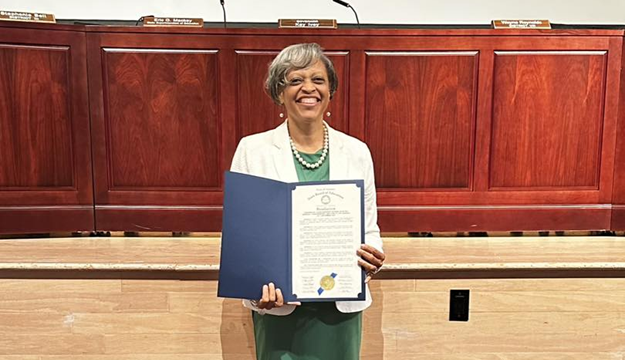
On Tuesday, members of the House Ways and Means Education Committee and the House Education Policy Committee held a joint meeting where they received an update from the Alabama State Department of Education (ALSDE) on the progress of implementing the changes in elementary math education that the Legislature ordered during the passage of the Numeracy Act. Dr. Karen Anderson is the director of ALSDE’s Office of Mathematics Improvement (OMI). She previously worked with ALSDE’s Office of School Improvement. “We are gearing up to prepare for NAEP in 2024,” Dr. Anderson said. “We are hoping to gain and improve on our stance when NAEP is given (in 2024).” Anderson said the goal is to ensure third-grade elementary students are at or above grade level in math. “An elementary school teacher should not engage in any practice that minimizes sense making and understanding of mathematics concepts,” Anderson said. “When a student is identified as having a deficiency in math, immediate action is taken,” Anderson said of the new teaching standards for math. Anderson said that the LETRS (Language Essentials for Teachers of Reading and Spelling) program used to improve reading performance is excellent, but “we are still searching for that equivalence in math.” Anderson said it establishes elementary and postsecondary mathematics task forces and provides mathematics coaches and training. Anderson said her office has had difficulty finding vendors for their new program. “We put out an RFP (request for proposal) for a fractional reasoning screener, and we got no response,” Anderson said. “Two companies said that they would develop one for us.” The Office of Mathematics Improvement has released another RFP seeking a qualified vendor. Anderson said the act also establishes the Alabama Mathematics Summer Achievement Program. “There are 18 OMI regional coordinators,” Anderson said. “Coordinators are assigned where the need is greatest.” Anderson said that currently, OMI has 83 schools receiving full and limited support. “The numeracy act provides very specific instruction for what instruction looks like in the classroom,” Anderson said. Specifically, that means there will be 60 minutes of instruction for Tier 1. “Math is not just a sit-and-get strategy,” Anderson said. “There is a real focus on classroom discourse and problem-solving. It should not be 100% sit and get.” “Immediate intervention is to be received if a math deficiency is identified,” Anderson said. “They are immediately provided with multi-tiered support.” Anderson said that she often hears folks say that they simply don’t like math. “That has really upset me,” Anderson said. “I am appalled to hear that.” Anderson said that some parents say, “I can’t do math. My father could not do math, and my son probably will not be able to do math.” Anderson said that OMI is “working to change that (mindset). Everyone can learn math.” “This is the first year that every student identified with a mathematical deficiency was invited to attend a math camp,” Anderson continued. “Thank you for providing that funding.” “Grades K-3 should have their mathematics embedded in their reading instruction,” Anderson explained. Anderson extolled the benefits of the Fun Zone program. “Fun Zone is comprised of 8 different tasks,” Anderson said. “We have trained more than 800 teachers in Fun Zone. Those that implemented Fun Zone as it was designed to be used saw improvement across the board.” “Thank you for the funding of math coaches,” Anderson said. “205 schools in all 11 regions will have math coaches. Math coaches trained by AMSTI. The Alabama coaching framework is foundational to all of the training.” “There are a number of external partnerships that we are working on,” Anderson explained. “174 areas require data under the Alabama Numeracy Act.” “We have gone across the state to provide professional development,” Anderson added, “Regional coordinators have been invited to provide a framework for what is in the law.” Anderson said there will be repercussions for schools not achieving the ALSDE goals. “If not successful after four years, even more strict consequences will be imposed,” Anderson said. “By fall of 2027, all K-5 schools will have a math coach in the school.” The House Ways and Means Education Committee is chaired by State Rep. Danny Garrett (R-Trussville). “We have to make sure that we are implementing the Numeracy Act,” Garrett said. “How is the task force functioning? Is there any areas of dissension or disagreement that we should be aware of?” Anderson replied, “No. We do have very spirited conversations, but I find those spirited conversations very uplifting.” “I have heard from people who were against the Numeracy Act to begin with who are concerned with how things are going,” Garrett said. “There is always a lot of Monday morning quarterbacking,” Anderson said. “Things are not going as quickly as I would have liked. We are getting things recommended as quickly as we can.” Anderson said that she has issued an RFP for intervention materials. “Twelve vendors have submitted packages,” said Anderson. “Are you comfortable then that there is the urgency that we seek? At this point, what do you look at to see if we are on track?” Garrett asked. “I don’t have a lot of data,” Anderson said. “The coordinators just came on in January. They have been working on building relationships.” “Is the state department ready for (school) interventions in 2025?” Garrett asked. “If we were expected now, we are not ready, but we are on track to be ready,” Anderson said. “I think we have a very good law and a very good plan,” said Garrett. Rep. Terri Collins (R-Decatur) asked about the tools available to implement the plan. “NUMBERS is not even close to LETRS,” Anderson said. Collins asked about OGAP (Ongoing Assessment Project. “OGAP is pretty sophisticated training,” Anderson said. “We have many teachers working on emergency certificates. We need to make sure that teachers have the proper pedagogy to be ready for OGAP.” “We have got ongoing meetings with our IT team,” Anderson said. “We are building structures as we need them.” Many legislators were at the Southern Legislative Conference (SLC) in Charleston, South Carolina, last week. Rep. Allen Baker (R-Brewton) said, “For those who weren’t present at SLC, Dr. Anderson- she is
Steve Flowers: Annual legislative session successful

The recently completed Regular Session of the Alabama legislature was a success. It began on a high note and ended positively. Why? There was plenty of money to spend. Both the General Fund Budget and the Education Budget had historic amounts of money. Most of the focus of the Session was on budgeting, as it should be, because that is the only constitutional mandate that the legislature is tasked with in the 105-day Regular Session. Gov. Kay Ivey laid out her agenda in her State of the State address, then sent her proposed budget requests over to the legislature. The governor’s speech outlining her legislative agenda was about doing good things for education. However, her desires were vague, and her ask list was long and wishful, like a kid’s Christmas wish list. It called for the state to give away the store. It was as though she was running for reelection, which everyone knows she cannot do. Therefore, the veteran Senate treats her politely but has relegated her to a lame-duck status. The legislature has taken total control of the budgeting process, as they should do under the Constitution. The governor proposes, and the legislature disposes. The days of a strong-armed, powerful, omnipotent governor that controls both the Executive and Legislative Branches are over. The King George Wallace era is gone, probably forever. The surplus in the Education Budget was enormous. How to spend this surplus became the focus of the entire session. There is a very accurate political assessment that it is much more difficult to deal with a surplus budget than a lean or deficit budget. George Wallace told me about this same thing during his last term as governor when I was a freshman legislator. Accolades go out to Senator Arthur Orr (R-Decatur), Chairman of the Senate Education Finance and Taxation Committee, and Representative Danny Garrett (R-Trussville), Chairman of the House Education Ways and Means Committee. These two gentlemen essentially singlehandedly wrote the Education Budget and did a masterful job. They were cognizant that what goes up has to come down. Therefore, they created several savings accounts and rainy day funds for the rainy days ahead because they will come. The Education Budget was an historic $11.5 billion. It gave increases for pre-kindergarten programs, school supplies, school nurses, and a significant 2% cost of living salary increase to teachers and support personnel. All colleges and universities in the state received increased funding. Non-education entities were given money. There was $100 million for prison education. The high-profile aspects of the Education Budget windfall were a one-time rebate going back to taxpayers in November. Governor Ivey had wished for a $400 per person and $800 per couple rebate. However, the final result is $150 per person and $300 per married couple. Most legislators preferred eliminating the grocery tax or long-term tax cuts to this one-time check back in November. The surprise in the Christmas stocking from the Education Budget surplus is the reduction on the state sales tax on groceries. Eliminating or reducing the state tax on groceries has been championed by Democrats for years, as the tax is regressive and hurts the state’s lowest income earners the hardest. However, the measure garnered Republican bipartisan support this year after 20 years and passed with an overwhelming vote in both Chambers. It is, however, a gradual reduction. The grocery tax would decrease 2% in two steps, with the tax being reduced 1% this year and another 1% percent new year, if the funds are available. The State General Fund had a good year as well. The $3 billion General Fund was record-shattering—the largest in history. The Chairmen, Senator Greg Albritton (R-Escambia) and Representative Rex Reynolds (R-Huntsville) oversaw a $159 million increase over the current year. The largest increases in the budget were in Medicaid by $69 million and Corrections by $59 million more. State employees will see a 2% increase in pay, which will go into effect as the new fiscal year begins October 1. The legendary head of the Alabama State Employees Association, Mac McArthur, has quietly garnered state employees a cost of living raise five out of the last six years. See you next week. Steve Flowers is Alabama’s leading political commentator. His weekly column appears in over 60 Alabama newspapers. He served 16 years in the state legislature. Steve may be reached at www.steveflowers.us.
Will Ainsworth: Alabama’s historic grocery tax cut shows me we must always attempt to accomplish what others say can’t be done

Alabamians may have felt their wallets bulge a bit last month when the Legislature approved our bill that slices the sales tax on groceries in half and implements the single largest tax cut in state history. Alabama was one of only three states that taxed groceries at the full rate – South Dakota and Mississippi are the others – and we were one of only 13 states in the nation that levied any tax on food. But beginning on September 1, 2023, Alabama’s 4% state sales tax on groceries will be cut to 3%, and another percent will be automatically deducted when revenues in the Education Trust Fund reach a trigger point that is set in the bill, which is expected to occur as soon as the next fiscal year. Safety provisions have been put in place to ensure that education dollars are protected as the $300 million tax cut goes into effect, and we remain dedicated to fully funding our K-12 public schools, community colleges, and public universities at all times. The bill uses the same definition of groceries as the federal food stamp program, known in D.C. nomenclature as SNAP, which means all groceries will be covered except for pre-prepared, hot food from grocery store delis. A close in the legislation blocks cities and counties from raising their sales taxes on groceries so Alabamians can be assured of the intended savings, but it does allow officials in city halls and county complexes to follow the Legislature’s lead and cut the local food tax, if they choose. For several decades, elected officials and advocacy groups across Alabama have attempted to reduce or remove the grocery tax, but their plans always required other taxes to be raised in order to offset the revenue losses. Many of those suggested tax increases targeted middle-class families, which always doomed the efforts from the start, especially among hardcore Republicans like me. As lieutenant governor, though, I noticed that the conservative budgeting practices implemented since Republicans gained control of the Legislature in 2010 have provided Alabama’s coffers with a sizable financial cushion that did not exist before. Our state’s business sector – ranging from the largest employers to the smallest, mom-and-pop operations – remains healthy, and our continuing success in attracting both new and expanding industries is resulting in unprecedented revenues flowing to the treasury. Putting pencil to paper and running the numbers soon revealed to me that Alabama could afford to cut the grocery tax without needing to penalize any groups or individuals by raising their existing levies. I met with countless experts, advisors, and associations, including the grocers who collect the tax at the point of sale, to rally them to take immediate action and worked with Sen. Andrew Jones (R – Centre), House Education Budget Chair Danny Garrett (R – Trussville), and Senate Education Budget Chair Arthur Orr (R – Decatur) to create a workable plan. Once lawmakers were briefed on our proposal, support for it spread like wildfire. All 35 members of the Alabama Senate agreed to serve as sponsors, along with 100 of the 105 members of the House. I am told by many longtime State House observers that no major bill of such significance has ever achieved the same unanimous and bipartisan support. Our dinner table tax cut will save the average Alabama family the cost of two weeks of groceries, and that financial relief is much needed in the current economic environment because the liberal fiscal policies being pushed and promoted by Joe Biden and congressional Democrats have caused inflation to skyrocket. Between 2022 and 2023, the cost of food rose by an average of 7.7%, according to the U.S. Bureau of Labor Statistics. Eggs alone cost a third more than they did last year, bread and cereal are up by 25%, and meat, fish, and chicken are substantially higher. Our success in cutting the grocery tax demonstrates what can be accomplished if we stay true to our conservative beliefs, build consensus among lawmakers, and have the courage to attempt to accomplish what many say can’t be done. But the job is only half-complete, and work still lies ahead as I am determined and fully committed to abolishing the grocery tax altogether. I ask all of you to join me in thanking each member of the legislature for supporting this historic tax cut. It was a true bipartisan effort. Together, we will continue making an already great state even better. Will Ainsworth has served as lieutenant governor of Alabama since 2019.
Gov. Kay Ivey Signs House Bill 77 to help small businesses succeed
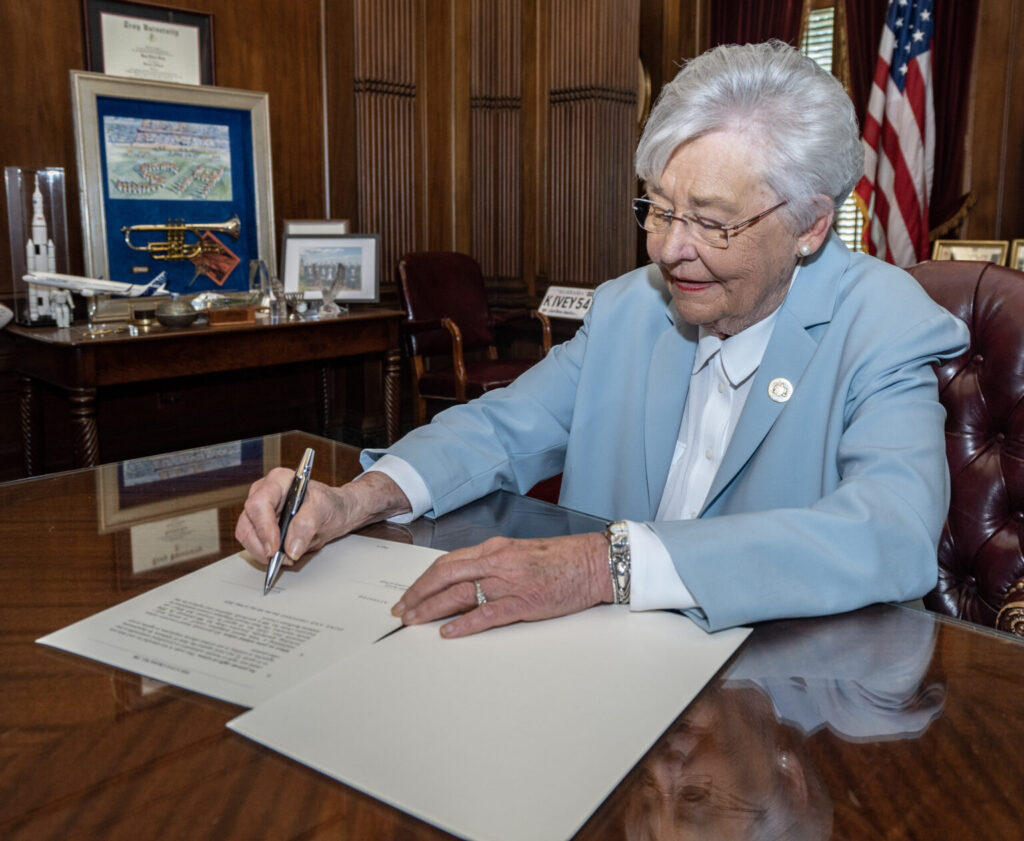
Governor Kay Ivey on Friday signed House Bill 77. During Governor Ivey’s 2023 State of the State Address, she called on the Legislature to help create greater economic stability for Alabama businesses operating in a challenging national economy. Ivey proposed that lawmakers reduce the financial load shouldered by small businesses by passing legislation lowering their prepaid sales tax burden. House Bill 77 increases the threshold for small businesses to submit their estimated monthly sales tax payments from $5,000 to $20,000 in average monthly sales tax liability. “Our economic stability begins and ends with the success of our small businesses, and it’s imperative that leaders at all levels of government actively look for ways to cut red tape and help them thrive,” said Gov. Ivey. “Eliminating the requirement for our small businesses with less than $500,000 in monthly sales to prepay taxes is a no-brainer. It not only frees up capital but also allows owners to focus solely on turning a profit every month and staying in business. This is an example of good government, and I commend the men and women of the Legislature for passing this bipartisan legislation for the people of our state.” The Alabama Department of Revenue estimates this legislation will positively impact over 3,000 small businesses in Alabama. House Bill 77 was sponsored by State Representative Danny Garrett (R-Trussville). Governor Ivey also signed House Bill 293 related to port credits. The governor released a statement saying that the port credit will encourage businesses in the state to increase shipping through the Alabama port. “As Alabama’s economy continues to grow, our public ports are valuable assets for businesses seeking to ship their in-demand products through the state,” said Gov. Ivey. “This legislation, which increases port-use tax credits, will encourage businesses engaged in manufacturing, warehousing, or distribution in the state to increase the volume of the cargo they ship through Alabama’s public ports. A compliment to Alabama’s successful ‘Game Plan’ economic incentives package which I signed into law in April, this legislation will also attract more jobs and investment to our state.” HB293 was sponsored by State Rep. Chip Brown (R-Hollinger’s Island). HB293 expands the cap of the port credit and expands tax incentives for businesses and enterprises that increase their cargo volume through Alabama public ports. Upon review of the applications, the commission may approve such applications as shall result in port credits being awarded so as not to exceed $20,000,000)for the life of the program, and shall not exceed $5,000,000) in a fiscal year. The commission shall charge application fees to offset the costs of administration of this article. Before claiming a port credit, the company shall submit to the Department of Commerce a certification containing information adequate to prove that the company is entitled to the credit. If approved by the commission, a port credit is allowed, in an amount equal to $50 per TEU, three dollars, $3 per net ton, $0.04 per kilogram for air freight, or $2.91 per VEU. The port credit may offset the tax levied by this chapter, but not below zero. The port credit may also offset the estimated payments of the tax levied by this chapter, but not below zero. In no event shall the port credits be allowed to reduce any estimated payment of the tax levied by this chapter before October 1, 2016. The 2023 Alabama Regular Legislative Session ended on Tuesday. To connect with the author of this story or to comment, email brandonmreporter@gmail.com.
Alabama legislators urge Air Force Secretary Frank Kendall to support congressional investigation into Space Command decision
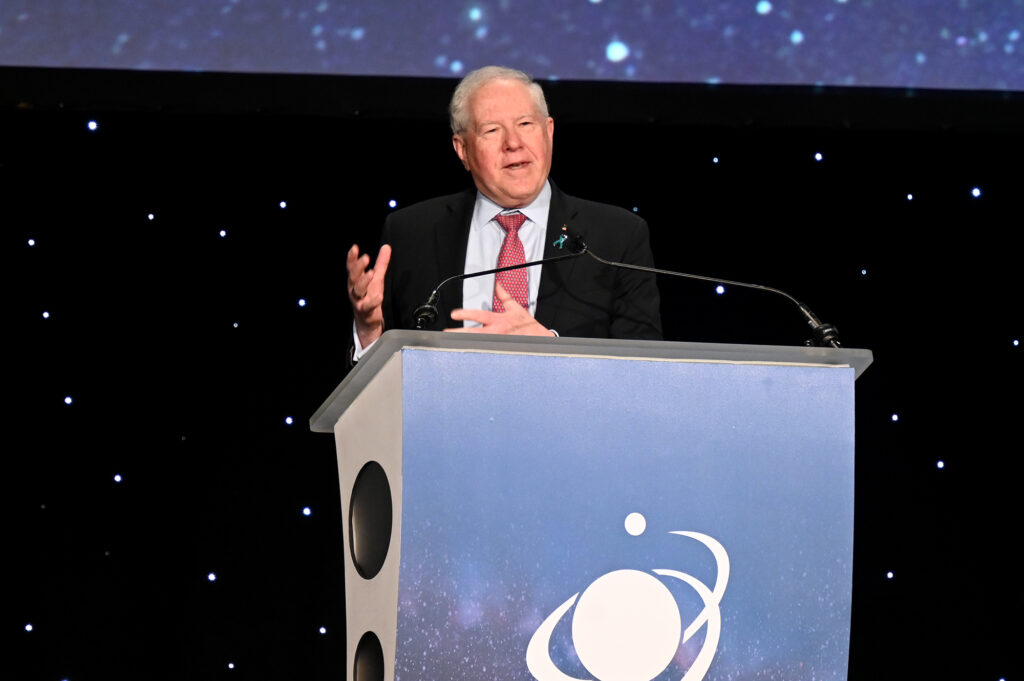
On Tuesday, a bipartisan group of legislators in the Alabama House of Representatives sent a letter to U.S. Airforce Secretary Frank Kendall supporting the congressional investigation led by U.S. House Armed Services Committee Chairman Mike Rogers and Congressman Dale Strong. The letter was signed by Speaker of the House Nathaniel Ledbetter, House Minority Leader Anthony Daniels, House Majority Leader Scott Stadthagan, and Speaker Pro Tem. Chris Pringle, as well as Reps. Joe Lovvorn, Danny Garrett, Wes Kitchens, Laura Hall, Parker Moore, David Cole, Rex Reynolds, Andy Whitt, James Lomax, Ritchie Whorton, and Phillip Rigsby. An NBC news report released on May 15 claimed that President Joe Biden will intervene to keep the Pentagon from moving Space Command from Colorado to Huntsville. The President’s objections to the state of Alabama are reportedly due to the state’s ban on abortion. Many speculate that the real reason could be political in that Colorado voted for Biden in 2020, while Alabama did not. Below is the text included in the attached letter: “Dear Secretary Kendall, “As members of the Huntsville and Madison delegations of the Alabama House of Representatives, and as House leadership, we are writing to you in support of the House Committee on Armed Services’ investigation into the delay in implementing the recommendation to place U.S. Space Command (SPACECOM) Headquarters at Redstone Arsenal, which is being led by U.S. House Armed Services Committee Chairman Mike Rogers and Congressman Dale Strong.” “As you are aware, it has been made clear through multiple U.S. Air Force recommendations that the most strategic location for the U.S. Space Command headquarters is Redstone Arsenal in Huntsville, Alabama. The Government Accountability Office and Department of Defense Inspector General have both confirmed this recommendation was made through a sound process. Huntsville has the infrastructure, the workforce, the education system, engineering base, existing military and defense apparatus, and quality of life to be the ideal location for U.S. Space Command. This is why this site has received the unanimous number one recommendation from the U.S. Air Force.” “As representatives of the communities surrounding Redstone Arsenal in the Alabama House of Representatives, we felt the need to respectfully encourage you to support and comply with the congressional investigation into the delay of this critical national security decision. We are also concerned to learn the U.S. Department of Defense was not aware, and not involved, in this change. The people of Alabama and the United States of America need and deserve transparency on the apparently revised mission requirements of SPACECOM as it relates to its decision to locate its headquarters.” “A lengthy delay in making a decision this important to national security deserves Congressional oversight, and we are thankful that Congressmen Rogers and Strong recognized this need and are taking action by launching this investigation. We greatly appreciate your service to our nation and the role that the U.S. Air Force has in keeping our country, and the world, safe from threats, and we believe that you also appreciate the need for transparency and Congressional oversight.” On Friday, Fox News published a story detailing an announcement from Rogers that he is opening an investigation into the continued delays in the selection of a permanent base for the U.S. Space Command (SPACECOM) Headquarters. “Today, I launched an investigation into the continued delays in the SPACECOM Headquarters basing decision,” said Chairman Rogers. “The fact is, the Air Force already made the correct decision well over two years ago. That decision was affirmed by the GAO and the DoD Inspector General over a year ago. This decision was based on multiple factors, and Redstone Arsenal in Huntsville, Alabama, was the clear winner in the Evaluation and Selection phase. I am deeply concerned that the continued delays in making this move final are politically motivated and damaging to our national security.” “I have requested that House Armed Services Committee Chairman, Mike Rogers, open a formal investigation into the Biden Administration’s failure to announce a permanent location for U.S. Space Command (SPACECOM) Headquarters,” said Rep. Strong.“The Administration’s delay risks politicizing a process which must remain fact-based. Injecting politics into America’s basing decisions serves to do unprecedented harm to our national security. American men and women in uniform must be given the very best, not the third or fourth choice. Redstone Arsenal was chosen as the preferred location after a years-long process. The decision was later confirmed not just once, but twice with the results of the Government Accountability Office and Department of Defense Inspector General investigations. It is plain and simple: Redstone Arsenal is the best possible location to host U.S. Space Command headquarters. The Air Force’s basing process established this, and it was confirmed. I thank Chairman Rogers for agreeing to this investigation. The members of the House Armed Services Committee, and our service members awaiting a final basing decision, deserve answers and swift action from the Air Force.” The letter by the State Representatives followed the announcement of the investigation by Rogers. To connect with the author of this story or to comment, email brandonmreporter@gmail.com.

